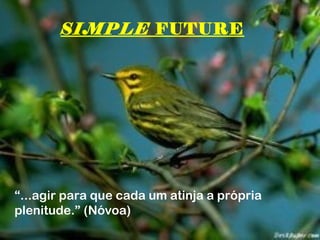
The Simple Future
- 1. SIMPLE FUTURE “...agir para que cada um atinja a própria plenitude.” (Nóvoa)
- 2. Pode-se dizer que o Simple Future, que equivale ao nosso futuro do presente, é o tempo verbal mais fácil do inglês. Para compô-lo, tan- to na forma afirmativa como na negativa e na interrogativa, basta utilizar o modal auxiliary WILL como o infinitivo do verbo sem TO. FORMA AFIRMATIVA: sujeito + WILL + infinitivo ( - to ) Ex.: She WILL wash the dishes later. FORMA NEGATIVA: sujeito + WILL NOT (WON’T) + infinitivo ( - to ) Ex.: I WON’T buy anything.
- 3. FORMA INTERROGATIVA : WILL + sujeito + infinitivo ( - to ) Ex.: WILL you do it for me? OBSERVAÇÃO: A) Na forma afirmativa, podemos fazer a contração de WILL com o pronome. Ex.: I will - I’ll / You will - You’ll / He will – He’ll B) Na forma negativa, a contração pode ser feita com o pronome ou com NOT. Ex.: I will not – I’ll not ou I won’t You will not – You’ll not ou You won’t C) Convém lembrar que, no inglês britânico, costuma-se usar SHALL em vez e WILL na 1ª pessoa do singular e na 1ª pessoa do plural. Ex.: I SHALL work. We SHALL work.
- 4. QUANDO USAR OQUANDO USAR O SIMPLE FUTURESIMPLE FUTURE a) Usamos o simple future para dizer o que vai acontecer, ou de – verá acontecer, em um futuro não – imediato. Ex.: Mary is a good student; She’ll pass the test. b) O simple future também pode ser usado para pedir a alguém que faça alguma coisa, dando um tom polido (educado) ao pe- dido. Nesse caso, em português, usamos um imperativo. Ex.: WILL you close the window, please? OBS: Quando a pessoa que fala se oferece para fazer alguma coi- as, ou está sugerindo algo, querendo saber se a outra pessoa a – ceita a sugestão, usamos SHALL, nunca WILL. Ex.: SHALL I call a doctor? (Chamo um médico?) Esse tipo de pergunta é comum, principalmente, em tratamento
- 5. formal. Em um restaurante, por exemplo, ao consultar a outra pessoa sobre o pedido ou perguntar se podem sair, diz –se: Ex.: SHALL we order? SHALL we go? GOODBYE!GOODBYE!
- 6. formal. Em um restaurante, por exemplo, ao consultar a outra pessoa sobre o pedido ou perguntar se podem sair, diz –se: Ex.: SHALL we order? SHALL we go? GOODBYE!GOODBYE!